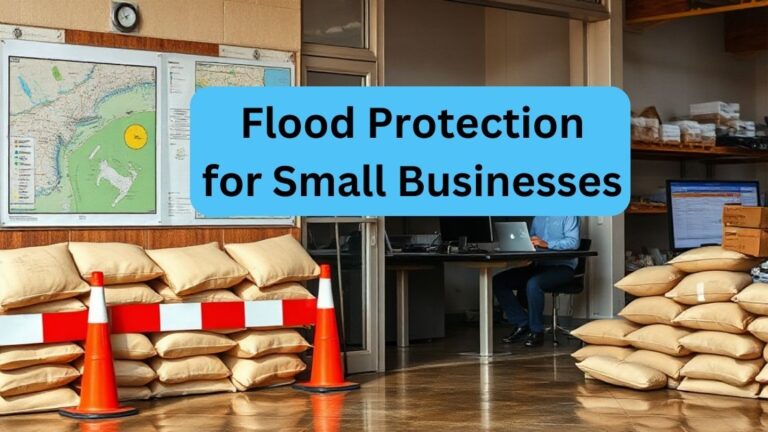Flooding can have devastating effects on small businesses, leading to significant financial losses and operational downtime. Implementing effective flood protection strategies is essential for safeguarding your business. In this article, we’ll outline key strategies that can help small business owners protect their premises and minimise flood-related risks.
With over 20 years in risk management, we offer tailored, easy-to-implement advice to secure your business.
Learn how to assess risks, create emergency plans, and ensure you have the right insurance cover in place to keep your operations afloat. Don’t gamble with your livelihood—protect it today!
Key Flood Protection Strategies for Small Businesses
Implement these essential strategies to safeguard your business in flood-prone areas.
Flood Risk Awareness
How well do small businesses understand the flood risks they face? With over 185,000 businesses in England and Wales situated in flood-prone areas, it is essential for them to grasp their local flood dynamics.
Effective flood mapping serves as a crucial tool in this understanding, allowing businesses to visualise potential threats. Moreover, risk communication plays a key role in fostering awareness and preparedness within the community.
Regularly reviewing flood response plans ensures that businesses adapt to their evolving environments. Employing resources such as the Environment Agency’s personal flood plan template can help create tailored strategies.
In addition, registering for flood warnings enables timely alerts, empowering businesses to take proactive measures. Together, these strategies enhance resilience and promote a culture of preparedness within the business community.
Business Continuity Planning
Effective business continuity planning is essential for small businesses, particularly in flood-prone areas where the risk of disruption is significant.
Developing a robust plan not only safeguards operations but also fosters a culture of preparedness among employees and stakeholders.
- Integrate flood risk assessments into your continuity plans.
- Develop clear action steps for immediate response, including contact lists.
- Involve stakeholders in the planning process to ensure comprehensive coverage.
- Regularly review and update plans, especially after operational changes.
- Implement emergency training sessions to build team resilience.
Go deeper: Flood Damage Prevention Measures.
Insurance Coverage Evaluation
As small businesses increasingly face the threat of flooding, evaluating insurance coverage becomes a vital component of risk management.
Conducting a thorough analysis of insurance policies is essential to identify coverage gaps that could leave your business vulnerable. Tailored options, such as specialised policies like FloodFlash, offer quicker payouts based on specific flood depth metrics, ensuring timely financial assistance.
Moreover, small and medium enterprises (SMEs) can benefit from the British Insurance Brokers’ Association’s commercial insurance scheme, which enhances access to better flood coverage.
It is important to review business interruption insurance to safeguard against income loss during flood events, as the average cost for affected businesses can reach £82,000.
Consulting current insurers about flooding specifics further strengthens your protection strategy.
Information Resources
Accessing reliable flood preparedness tools is essential for small businesses aiming to safeguard their operations against potential flooding.
Employing expert consultants, such as PCLA, can provide tailored strategies and support.
Accessing Flood Preparedness Tools
In the face of increasing flood risks, small businesses must use available resources to enhance their preparedness and resilience.
Accessing flood preparedness tools is essential for effective risk management and recovery planning. Here are some valuable resources to consider:
- PCLA for tailored support and insurance advice
- The Flood Toolkit for resilience-building strategies
- National Flood Forum for expert guidance and support
- Environment Agency’s free personal flood plan template
- Engagement with local flood risk management bodies and downloadable resources from BIBA and BITC
Ask For Expert Guidance
Expert guidance resources play a pivotal role in helping small businesses navigate the complexities of flood preparedness and resilience. Engaging in expert consultation through organisations like PCLA and the National Flood Forum equips businesses with tailored support and essential strategies.
The Flood Toolkit provides actionable insights, ensuring that businesses are well-prepared for potential flooding. Resource networking, including access to the British Insurance Brokers’ Association (BIBA), offers opportunities to find suitable insurance options tailored to specific needs.
Regularly reviewing and updating flood plans with free templates available enhances relevance and effectiveness. By leveraging these resources, small businesses can foster a proactive approach to flood risks, nurturing a sense of community and belonging in their resilience efforts.
Business Support Services
Business support services play an essential role in equipping small enterprises to effectively manage flood risks.
Tailored insurance options and dedicated support services from organisations like the PCLA empower businesses to secure appropriate coverage while accessing critical resources for disaster preparedness.
These offerings not only enhance financial resilience but also provide the necessary expertise to navigate the complexities of flood-related challenges.
Related: Causes of Commercial Water Leaks
Tailored Insurance Options
Flood protection is a critical concern for small enterprises, particularly those located in vulnerable areas. Investigating tailored insurance options is essential to ensure adequate coverage against flooding incidents.
Consider the following strategies:
- Look into insurance policy types specifically designed for flood-prone regions.
- Utilise schemes such as the British Insurance Brokers’ Association (BIBA) for appropriate flood coverage.
- Explore event-based insurance policies, such as FloodFlash, for quicker financial relief.
- Conduct property-level flood surveys to enhance insurance acceptance and terms.
- Consult with insurance experts for personalised coverage customisation that includes business interruption insurance.
Flood Preparedness Measures
Effective flood preparedness measures are vital for any enterprise situated in a flood-prone area. Developing a comprehensive flood plan is imperative, detailing actions to take upon receiving flood alerts and incorporating Property Flood Resilience (PFR) strategies.
Regularly reviewing and updating these plans can greatly reduce risks, as statistics reveal that 40% of small businesses that flood do not recover.
Consider these key actions:
- Monitor weather forecasts and flood alerts consistently.
- Secure essential documents and equipment in advance.
- Ensure emergency supplies are readily available.
- Conduct team training to familiarise staff with the flood plan.
- Engage with local resources for community support.
Response and Recovery Strategies
Having established robust flood preparedness measures, businesses must now focus on their response and recovery strategies in the event of a flood. Immediate activation of the flood plan is essential for ensuring personnel safety, effective communication, and asset protection.
| Response Actions | Recovery Steps | Continuous Improvement |
|---|---|---|
| Conduct emergency drills | Assess damage thoroughly | Review flood plan effectiveness |
| Provide staff training | Engage with insurance providers | Offer support resources for staff |
| Ensure clear communication | Expedite claims processing | Identify areas for future prevention |
Post-flood recovery begins with a comprehensive damage assessment, which is critical for insurance claims. By supporting affected staff, businesses can foster resilience and morale, paving the way for a smoother recovery process and better preparedness for future incidents.
Financial Considerations for Flooding
While the physical damage caused by flooding can be devastating, the financial implications often pose an even greater threat to small businesses. The average cost of flood damage is approximately £80,000, and 40% of small businesses close permanently after such disasters.
This highlights the urgent need for financial preparedness and robust insurance solutions.
- Understand the financial impact of flooding on operations.
- Investigate parametric insurance for straightforward claims.
- Invest in business interruption insurance to cover lost earnings.
- Assess the challenges of obtaining adequate flood insurance.
- Plan for recovery to minimise long-term financial strain.
Key Takeaways
- Develop a comprehensive flood plan that includes clear action steps and stakeholder involvement to ensure an effective response during flood events.
- Regularly review and update your flood response plans to adapt to changing environmental conditions and maintain readiness.
- Evaluate insurance coverage thoroughly to identify gaps and consider specialised policies like FloodFlash for prompt financial support during floods.
- Conduct emergency drills and staff training to enhance team preparedness and ensure effective communication during flood emergencies.
- Engage with local flood risk management resources and utilise tools like the Flood Toolkit to bolster your flood resilience strategies.
Have you been affected by flood damage?
Don’t wait until it’s too late! Discover how our expert Water Damage Insurance Claim Support can save you time, money, and stress!
Imagine having a dedicated team by your side, guiding you through the complicated insurance claim process. Our experienced professionals know exactly what it takes to efficiently handle water damage claims, ensuring you get the compensation you deserve.
With our comprehensive support, you can focus on restoring your property while we manage the paperwork, negotiate with your insurance company, and provide expert advice. Don’t let water damage turn into a financial nightmare. Our proven track record speaks for itself!
Take control of your water damage situation today. Contact us now for a free consultation and see how our Water Damage Insurance Claim Support can make all the difference.



